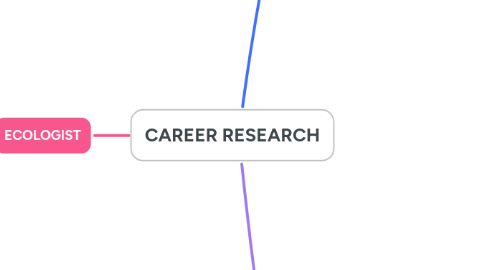
1. MARINE BIOLOGIST
1.1. *WHAT DO THEY DO?*
1.1.1. study samples collected from marine habitat, hypothesize new thories based on the research
1.1.2. focus on maintaining the marine environment health via reducing the polluting sources
1.1.3. experiments with collected specimens, compile data to analyze the marine animal life and the damage from human activity
1.2. WHO ARE THE EMPLOYER?
1.2.1. engineering companies
1.2.2. sustainability consultancies
1.2.3. pollution control NPOs
1.2.4. governmental organizations
1.3. WHAT IS AVERAGE ANNUAL SALARY?
1.3.1. CA$54,307 per year
1.3.1.1. beginners; $40k
1.3.1.2. experts; $99k
1.4. WHAT DEGREE IS REQUIRED?
1.4.1. marine biology based courses, bachelor degree as requisite (4 years)
1.4.1.1. marine biology
1.4.1.2. marine science
1.4.1.3. coastal ecology
1.4.1.4. oceanography
1.4.1.5. etc.
1.4.2. post-grad degree (master, doctor) for specialized degrees as optional
1.4.2.1. tropical marine
1.4.2.2. aquatic conservation
1.4.2.3. etc.
1.5. *HOWS THE LIFESTYLE OF THEM?*
1.5.1. stays at laboratory most of the time
1.5.2. field work at sea or ocean for collecting samples
1.5.3. reach out to organizations for management and consultant
1.5.4. working hours vary; usually 40-50 hrs a week
1.5.5. dress code is casual and informal, safety prioritized
2. EMBRYOLOGIST
2.1. *WHAT DO THEY DO?*
2.1.1. collect eggs and perform vitro fertilization
2.1.2. observe reaction & appearance of eggs through testing
2.1.3. study and hypothesize in the field of embryology
2.1.4. conversation with patients and clients of fertility system
2.2. WHO ARE THE EMPLOYER?
2.2.1. hospitals and fertility clinics
2.2.2. university or organization lab
2.2.3. product-sales companies
2.3. WHAT IS AVERAGE ANNUAL SALARY?
2.3.1. CA$65,184 per year
2.3.1.1. beginners; $43k
2.3.1.2. experts; $99k
2.4. WHAT DEGREE IS REQUIRED?
2.4.1. bachelor's degree for 4 years is requisite
2.4.1.1. biomedicine
2.4.1.2. biology
2.4.1.3. biomedical science
2.4.2. optional or required for some position, post-graduate degree (master, doctor)
2.4.2.1. clinical embryology
2.5. *HOWS THE LIFESTYLE OF THEM?*
2.5.1. mostly spend time in the laboratory
2.5.2. usually work during weekend and overtime as well
2.5.3. work/life balance not guaranteed
2.5.4. contact with many patients to collect samples
2.5.5. counseling and consulting about fertility
3. ECOLOGIST
3.1. *WHAT DO THEY DO?*
3.1.1. surveys through field work to collect data about biodiversity
3.1.2. analyze the data through taxonomy & focus on habitat management
3.1.3. teach the public through professional speech and school lectures
3.1.4. suggest ideas about regulations & policies to be environment-friendly
3.2. WHO ARE THE EMPLOYER?
3.2.1. natural sustainability agencies
3.2.2. governmental organizations
3.2.3. academic associations
3.2.4. non-profit orgaizations
3.3. WHAT IS AVERAGE ANNUAL SALARY?
3.3.1. CA$75,898 per year
3.3.1.1. beginners; $69k
3.3.1.2. experts; $86k
3.4. WHAT DEGREE IS REQUIRED?
3.4.1. bachelor's degree for 4 years as requisite of this occupation
3.4.1.1. biology or ecology
3.4.1.2. botany or zoology
3.4.1.3. conservation/sustainability
3.4.1.4. environmental biology
3.4.2. post-graduate degree (master, doctor) as optional or specialized such as consultancy or academics
3.5. *HOWS THE LIFESTYLE OF THEM?*
3.5.1. field survey work in various habitats; marine, tropical, etc.
3.5.2. ecologist associations provide various job opportunities
3.5.3. sometimes requires business trip overseas
3.5.4. working hour is usually more than 30 hours, highly flexible
3.5.5. most ecologists juggle their own project with employment; fundraising is manageable
